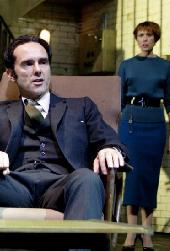SITE GUIDE
SEARCH
REVIEWS
FEATURES
NEWS
Etcetera and
Short Term Listings
LISTINGS
Broadway
Off-Broadway
NYC Restaurants
BOOKS and CDs
OTHER PLACES
Berkshires
London
California
New Jersey
DC
Philadelphia
Elsewhere
QUOTES
TKTS
PLAYWRIGHTS' ALBUMS
LETTERS TO EDITOR
FILM
LINKS
MISCELLANEOUS
Free Updates
Masthead
A CurtainUp  London Review
London Review
 London Review
London ReviewThe Hothouse
|
The day got off to a lousy start: a birth and a death. Absolutely scandalous! Is it too much to ask to keep the place clean?— Rootes
|
 1.
1. Finbar Lynch as Gibbs, Lia Williams as Miss Cutts
(Photo: Catherine Ashmore) |
Although set in a mental asylum, the patients are permanently offstage and only ever referred to by numbers rather than names. Instead, the cast is made up of the staff running the institution. We are told that the patients "are not criminals" and are only there because they are "in need of help", but their incarceration is so far from being compassionate that the staff scarcely seem to give them, or their treatment, any thought. The chillingly absolute and unfeeling control exercised over them, is not even worthy of much discussion.
On Christmas morning, the director Rootes (Stephen Moore) is informed of two patients' situations: one who has died of what is suspiciously termed "heart disease" and another who has given birth. The investigation for the impregnator of patient number 6459 begins, as Rootes immediately suspects that his staff have not been filing the correct reports.
Stephen plays the seemingly bumbling head of the institution, reminiscing about his former military days, rambling at a length which simply exposes the gulf between his preaching and practice. However, Pinter's writing requires a certain type of unemotive acting style, which doesn't quite suit the likeable Moore. Conversely, Finbar Lynch, who plays the political, ambitious underling Gibbs, is able to portray Pinter's character with perfect unflappable poise and simultaneously portray a sense of thunderous inner loathing. He boasts an incredibly powerful, unflinching stare and the unruffled calm with which he conducts himself is chilling. This includes exacting torture which is neither punitive nor investigative on the hapless, innocent (although not especially likeable either) Lamb (Leo Bill). Other excellent performances include Paul Ritter as Lush who shows off amazing streaks of eloquence as he fabricates the departure of recently dead patient 6457. Lia Williams is also superb as the only female onstage, Miss Cutts, in an angular, mannered and emotional performance.
The design shows a grim, dingy institutional building in an impressively dreary set. There are greyed and yellowed walls, dampness which you can practically feel, and the window panes possess a thick sheen of dust. In one corner, there is a single, twisty, miserable looking spider plant. The tall windows face onto nothing other than walled buildings and bins. Blocks of light illuminate and separate sections of the set, giving a very tangible sense of a large establishment. One of these blocks focuses on a stairwell, where voices memorably echo. In fact, the sound is well-designed throughout, with subtle unsettling music and intermittent sounds from the patients which unnerve the staff as much as the audience.
Pinter's great talent is his ability to raze humanity to the ground. He portrays characters who are not particularly evil or chilling, just unfeeling. They maintain a semblance of a social veneer, although there is unpredictable dialogue, inexplicable motivation and an overall certain barrenness which is inherent to Pinter's world view. Nevertheless, this fantastic production harnesses the annihilating energy into a powerful, if nihilistic, evening.
|
THE HOTHOUSE
Written by Harold Pinter Directed by Ian Rickson Starring: Finbar Lynch, Paul Ritter, Stephen Moore, Lia Williams With: Henry Woolf, Leo Bill, Peter Pacey Design: Hildegard Bechtler Lighting: Peter Mumford Sound: Ian Dickinson Movement: Scott Graham and Steven Hoggett for Frantic Assembly Music: Stephen Warbeck Running time: Two hours 30 minutes with one interval Box Office: 0207 420 3000 Booking to 4th September 2007 Reviewed by Charlotte Loveridge based on 19th July 2007 performance at Lyttelton Theatre, Royal National Theatre, South Bank, London SE1 (Rail/Tube: Waterloo) |
|
London Theatre Tickets Lion King Tickets Billy Elliot Tickets Mary Poppins Tickets Mamma Mia Tickets We Will Rock You Tickets Theatre Tickets |




